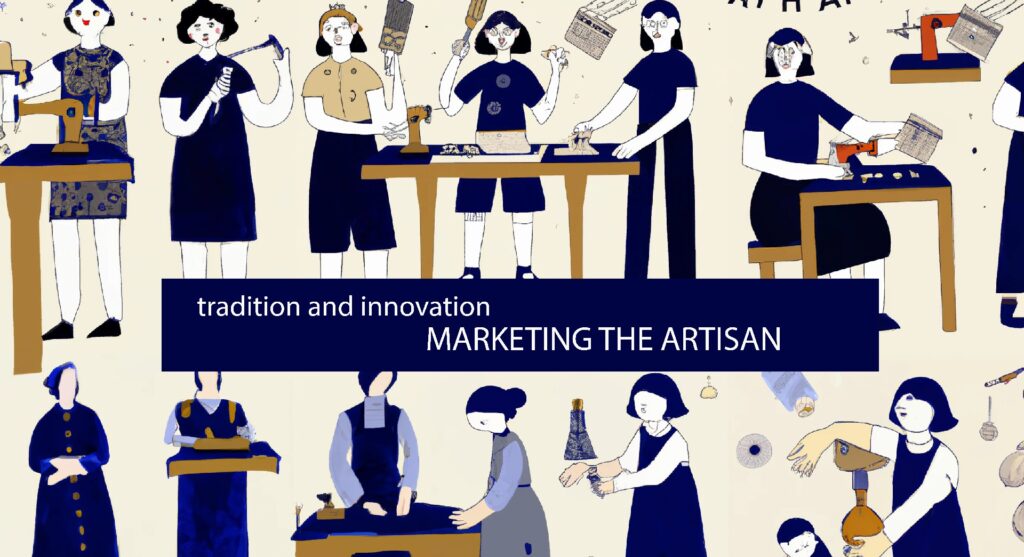
Handmade Products Marketing: Innovation meets artisanal tradition
In recent years, there has been a growing trend towards buying handmade products. Consumers are looking for unique, one-of-a-kind items that are made with care and attention to detail. As a result, handmade products marketing has become more important than ever for small businesses and artisans that craft this amazing items and shaping the lifestyle brands associated with them
Handmade products such as artisanal soap or candles have a unique charm that mass-produced items simply can’t match. They offer a personal touch, a sense of craftsmanship, and often, a connection to the maker. This is why handmade products have become increasingly popular with consumers seeking out one-of-a-kind items that are not only functional but also have a story to tell.

One of the biggest advantages of the handmade products industry is the level of customization that it offers. Many artisans are able to create one-of-a-kind pieces that are tailored to the customer’s specific needs and preferences. This level of personalization is highly valued by consumers who are seeking items that are unique to them.
Another advantage of the handmade products industry is the emphasis on quality and sustainability. Many artisans use high-quality materials and techniques to craft their products, which often results in items that are more durable and long-lasting than their mass-produced counterparts. Additionally, many handmade products are created using sustainable materials and production methods, which appeals to consumers who are interested in reducing their environmental footprint.
Marketing handmade products can be a challenge, but there are several strategies that can help artisans succeed in this competitive industry. One of the most important strategies is to establish a strong brand identity that reflects the values and personality of the business. This can be achieved through effective branding, such as a memorable logo, color scheme, and messaging that resonates with the target audience.
Social media is also a powerful tool for marketing handmade products. Many artisans use platforms like Instagram, Facebook, and Pinterest to showcase their products and connect with potential customers. By sharing behind-the-scenes photos, product updates, and customer testimonials, artisans can build a loyal following and generate buzz around their brand.
In addition to social media, participating in local markets, fairs, and craft shows can also be a great way to market handmade products. These events provide an opportunity to connect with customers in person, showcase products, and receive feedback from potential buyers.
Overall, the handmade craft products industry offers a unique and exciting space for artisans and consumers alike. With the right handmade product marketing strategies and a commitment to quality and sustainability, artisans can succeed in this competitive industry and create beautiful, handmade products that are treasured by customers for years to come.

Trends in the handmade products industry
The craft products “industry” is affected by some macro trends, that creators should be aware of in order to successfully perform a comprehensive handmade products marketing strategy, product here is front-and-centre:
Sustainability
One of the most significant trends in the handmade products industry is a focus on sustainability. Consumers are increasingly concerned about the environmental impact of their purchases and are seeking out products that are eco-friendly and ethically made. Many makers are using sustainable materials such as recycled fabrics, natural dyes, and biodegradable packaging. Additionally, makers are reducing waste by repurposing materials and creating items that are durable and long-lasting.
Social Responsibility
Another trend in the handmade products industry is a focus on social responsibility. Consumers are increasingly interested in supporting small businesses and makers who prioritize fair labor practices and ethical sourcing. Many makers are working with local artisans and communities to create their products and are transparent about their production processes. Additionally, makers are donating a portion of their profits to charitable causes and using their platforms to raise awareness about social issues.
Personalization
Personalization is another significant trend in the handmade products industry. Consumers are seeking out products that are unique and reflect their individual style. Many makers are offering customizable options, allowing customers to choose colors, fabrics, and other details to create a one-of-a-kind item. Personalization not only allows makers to stand out in a crowded market, but also fosters a deeper connection between the customer and the product.
Digital Presence
Finally, the importance of a strong digital presence cannot be ignored in the handmade products industry. Social media platforms such as Instagram and Pinterest have become crucial marketing tools for makers, allowing them to showcase their products and connect with potential customers. Many makers are also selling their products online through e-commerce platforms such as Etsy and Shopify. A strong digital presence not only helps makers reach a wider audience, but also allows them to build relationships with their customers and establish their brand identity.

There are many successful marketing of handmade products brands that have gained popularity and recognition for their unique and high-quality creations. Here are a few examples:
Etsy: Impossible not to mention when discussion the handmade products marketing theme, Etsy is a well-known online marketplace that features handmade products from around the world. It has become a go-to destination for buyers looking for unique, one-of-a-kind items and has helped many artisans turn their handmade creations into successful businesses.
Soko:
Soko is a handmade jewelry lifestyle brand that works with artisans in Kenya to create stunning, ethically-made pieces. Their jewelry is both stylish and sustainable, and they have gained a lot of recognition for their unique designs and commitment to ethical production practices.
SVNR
SVNR (read souvenir) is a New York-based jewelry brand that creates unique pieces using found, upcycled, and natural materials. Founded by Christina Tung, the brand is inspired by her love for travel and her fascination with natural objects. Each piece of jewelry is meticulously crafted by hand, making every piece unique and one-of-a-kind. SVNR’s designs are a fusion of different cultures, materials, and aesthetics, resulting in a diverse and eclectic collection. The brand’s commitment to sustainability is reflected in its use of recycled and natural materials, as well as its minimal waste production process. With its distinctive and eco-friendly approach to jewelry making, SVNR has quickly gained a following and has been featured in various fashion publications.
Boll & Branch:
Boll & Branch is a handmade bedding brand that uses high-quality, organic materials to create luxurious sheets and blankets. Their products are designed and crafted by skilled artisans, and they have gained a lot of recognition for their commitment to sustainable and ethical production practices.
Fauna y flora
Fauna y Flora is a handmade jewelry lifestyle brand founded by two friends, Feli and Fernanda, who share a passion for nature and design. The brand’s name, which means “Fauna and Flora” in Spanish, reflects their inspiration drawn from the beauty and diversity of the natural world. Each piece of jewelry is carefully crafted by hand, using sustainable materials such as recycled brass, natural stones, and shells. Fauna y Flora’s designs feature delicate and intricate details, showcasing the beauty of nature in every piece and making the manufacturer a case study of top-notch design as well as handmade product marketing. The brand’s unique and eco-conscious approach to jewelry-making has gained a following among those who value sustainability and appreciate the beauty of handmade products. From earrings to necklaces, each piece is a wearable work of art that captures the essence of nature.

Successful marketing of handmade products involves identifying the target audience and creating a brand that resonates with them. It’s important to showcase the unique qualities and the story behind each handmade product, highlighting the craftsmanship and attention to detail that goes into making each item. Social media platforms like Instagram and Pinterest are great for showcasing handmade products and reaching a wider audience. Building a strong online presence through a website or an online marketplace like Etsy is also essential. Collaborating with influencers or bloggers in the handmade or niche markets can help generate buzz and drive traffic to your website or store. It’s important to invest in high-quality product photography and product descriptions that convey the unique features and benefits of each handmade product. Offering excellent customer service and creating a personalized experience for customers can also help build a loyal customer base. Finally, being transparent about your production process, materials, and pricing can help build trust and credibility with customers, making them more likely to purchase handmade products.
Made in: the country of origin factor in craft products marketing
Many countries are well renowed for their artisanal tradition and remain top of mind in the eyes of the consumers for specific handmade crafts: for example, in Italy specific cities are famous for their productions such as the glassware in Murano in the Venice lagoon or the leather districts of Tuscany. Leverage your country of origin to manufacture legacy items that consumers will be happy to purchase, some example of local expertise:
Japan – Origami, pottery, calligraphy, woodblock prints, and traditional dolls.
India – Hand-woven textiles, embroidered fabrics, block-printed textiles, pottery, and metalwork.
Mexico – Pottery, textiles, wood carvings, and silver jewelry.
Peru – Textiles, ceramics, pottery, and wood carvings.
Thailand – Handmade paper products, wood carvings, ceramics, and silk textiles.
Indonesia – Batik textiles, wood carvings, pottery, and silver jewelry.
Turkey – Kilim rugs, ceramics, glassware, and jewelry.
Kenya – Beadwork, wood carvings, and textiles.
Morocco – Leather goods, textiles, pottery, and ceramics.
Greece – Pottery, ceramics, and textiles.

Handcraft markers as a sales channel
Markets remain the typical sales channel for handmade products, with consumers being prone to purchase in the pleasant atmosphere of traditional fairs and more contemporary retail concepts:
Marketing handmade products at a market stand can be a challenge. With so many vendors competing for attention, it’s important to have effective marketing strategies in place to help your products stand out. Here are some of the best marketing strategies for handmade market stands:
Eye-catching displays: Your product display should be visually appealing and attract potential customers. Consider using unique props or signage that showcases your brand and style.
Demonstrations: Demonstrate your craft or artistry to show potential customers the quality and care that goes into each piece. This helps build trust and credibility with customers.
Samples and testers: Offer samples or testers to allow customers to see and feel the quality of your products. This can help them make informed decisions and increase the likelihood of a sale.
Social media: Utilize social media platforms like Instagram and Facebook to promote your market stand before, during, and after the event. Use hashtags and geotags to reach a wider audience and showcase your products.
Email marketing: Collect customer emails at your market stand and use them to send promotional offers and updates about future events and product launches.
Collaborations: Collaborate with other vendors or complementary brands to create a larger impact and attract a wider audience.
Special offers: Offer special deals or discounts to encourage customers to make a purchase. Consider bundling products or offering a free gift with purchase.
By implementing these marketing strategies, you can effectively market your handmade products at market stands and increase your sales and customer base. Remember to stay creative, flexible, and attentive to your customers’ needs and feedback to ensure the success of your business. At Ikono we can help your handmade brand get known worldwide, get in contact now!
Ikono is a lifestyle brand agency that can support you in marketing your lifestyle product


